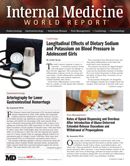Publication
Article
Internal Medicine World Report
Air Pollutants Also Come with Neuro Effects
Author(s):
An opinion piece recently published in JAMA Psychiatry cautioned that air quality can also affect brain development, potentially triggering a larger public health issue.

An opinion piece recently published in JAMA Psychiatry cautioned that air quality can also affect brain development, potentially triggering a larger public health issue.
The Environmental Protection Agency (EPA) sets air quality standards to curb the effects of a host of pollutants, including particulate matter (PM), ozone, nitrogen and sulfur dioxides, lead, and carbon monoxide.
However, according to Lilian Calderón-Garcidueñas, MA, MD, PhD, Center for Structural and Functional Neurosciences, University of Montana, and Ricardo Torres-Jardón, PhD, National Autonomous University of Mexico, monitoring indoor pollutants is just as important, since people spend more than 90% of their time inside.
For these researchers, polycyclic aromatic hydrocarbons (PAHs) were specifically disconcerting, since they were typically not monitored. When accessed, PAHs are detected by “filter collection and analysis by gas chromatography/mass spectrometry, aerosol photoionization, and aerosol mass spectrometry,” the authors noted.
Fetal exposure to PAHs could have particularly detrimental effects. PAHs can be passed on to infants through breast milk and through other means, including tobacco smoke, transportation emissions, and foods that are smoked or cooked with frying oils. Because of the pervasiveness of PAHs in the environment, children are being exposed to them throughout their lives. To support this premise, the investigators referred to a study of 2,748 children, adolescents, and adults which found that all participants had PAH in their urine, with 6- to 11-year-olds having the highest levels.
While there is mounting evidence these particles are associated with cardiovascular diseases, the authors warned that research has also shown they can affect the brain (specifically mental health).
The researchers also noted that studies have found an increase in emergency hospitalizations for suicide attempts and depression, and that PM exposure has been linked to depression. Furthermore, increased exposure during childhood has also been determined to affect depression development and psychosis later in life.
“The associations between brain development impairment with consequent structural, cognitive, and behavioral problems; major psychiatric disorders; systemic inflammation; neuro-inflammation; and increased risk of developing neurodegenerative disorders with air pollution provide support for models conceptualizing modifiable environmental risk factors open to preventive intervention,” the study authors observed.
In the future, the team pressed for more research into air pollutant exposure, nutrition, and genetic factors that could influence the relationship between air quality and mental health, which they hoped could provide insight into better preventative measures and treatments.






